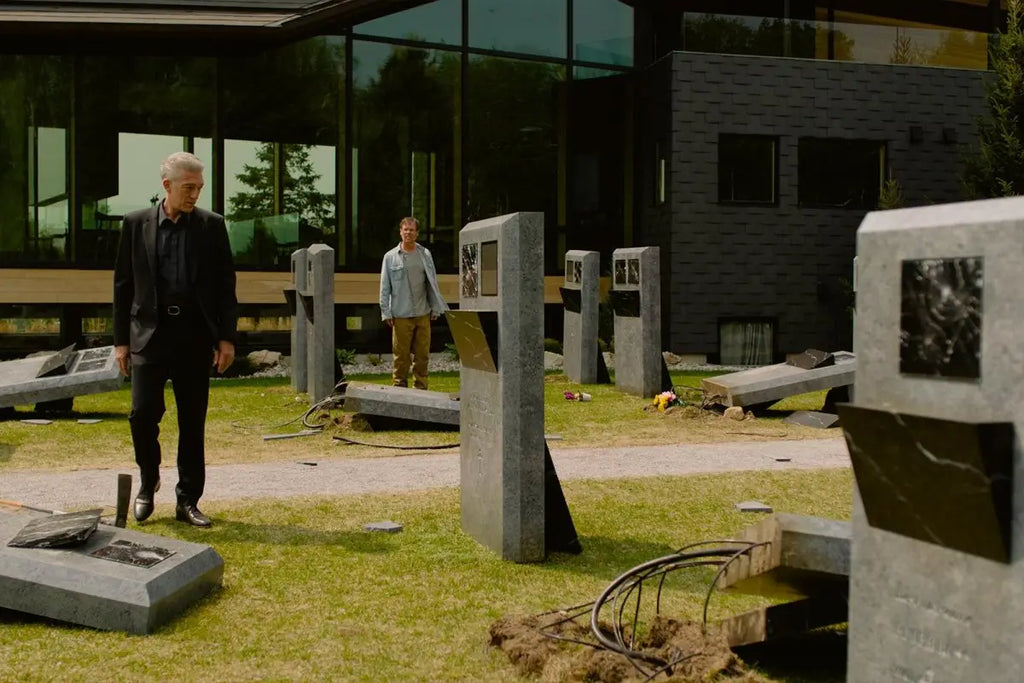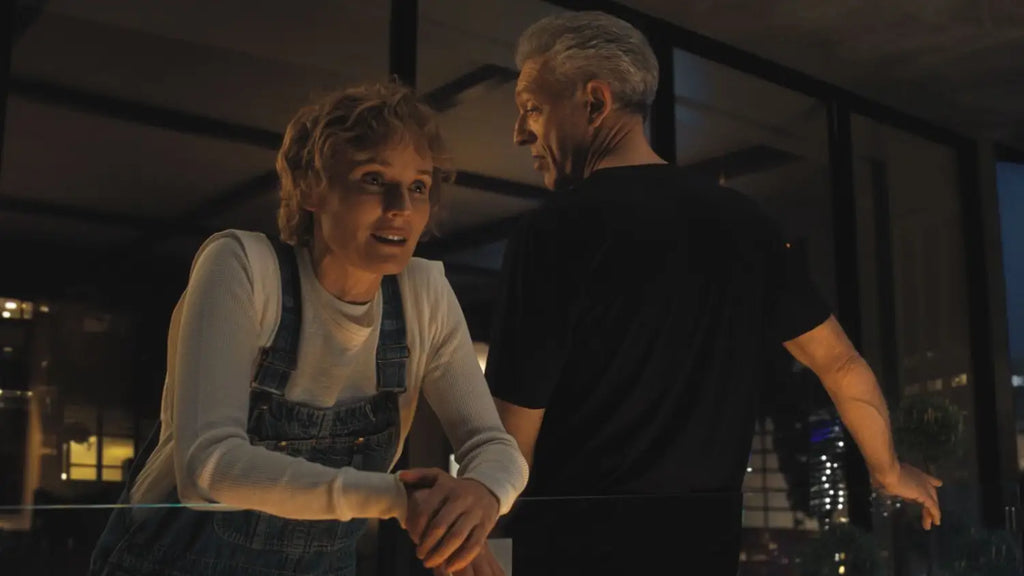For over half a century, David Cronenberg has bent the boundaries of genre and form with a body of work that literally defined the term “body horror.” From The Fly to Videodrome and beyond, his films have long examined the entanglement of flesh and technology, of biology and desire, of the brain and the inexplicably broken systems surrounding it. And yet The Shrouds, releasing just three years after his striking return in Crimes of the Future, may be the first of his films to feel this intimately wounded, this emotionally raw. It is unmistakably the work of a man deep in grief - and of an artist still attempting to make sense of the loss.
Vincent Cassel, in a role so tailor-made it borders on eerie, plays Karsh - an aging tech entrepreneur who shares more than a few traits with Cronenberg himself, right down to the piercing-white hair, the cerebral demeanor, and the chilling clarity with which he describes his grief. Karsh is the founder of GraveTech, a company that has installed high-definition cameras into high-end coffins. Its purpose: to allow the bereaved to watch their loved ones decompose in real time through an app called “Graveview.”
It’s a sci-fi premise only Cronenberg could imagine, but as always, the concept is far less far-fetched than it seems. Karsh lost his wife, Becca, to cancer, and finds a warped kind of comfort in watching her corpse rot from beneath the earth. His dentist even notes that Karsh’s teeth are decaying - grief literally eating away at his body. Cronenberg has spoken publicly about the autobiographical origins of the film - how the death of his own wife left him unable to find solace in grief literature, which often overlooked the visceral, physical component of long-term partnership and intimacy. The Shrouds is, in that sense, an act of artistic exposure - a film about the sexual and corporeal severing that happens when a person loses the body they once loved.

Cassel’s performance is cool and composed on the surface, but utterly gutted beneath. His Karsh is a man attempting to intellectualize the abyss. When Graveview is sabotaged by unknown vandals, he spirals - not from a sense of business failure, but because his one link to his wife’s body has been severed. It’s only then that Karsh starts leaning on other strange crutches to cope: an AI avatar modeled after Becca named Hunny (clearly used for much more than simply scheduling appointments), and increasingly close proximity to Becca’s sister, Terry - played in a layered, triptych performance by Diane Kruger.
Kruger is a revelation here, tasked with playing not just one, but three distinct characters (Terry, Becca, and Hunny) who all serve as projections of Karsh’s fractured memory and longing. The dynamic between Karsh and Terry becomes the film’s most electric thread in its back half, offering a quiet intensity and a simmering tension that feels increasingly taboo. It’s also the beating heart of the film: a sad, strange meditation on the dangers of filling in the void left behind by death with whatever - or whoever - is closest.
There is a subplot involving a conspiracy around the grave vandalism, potentially linked to international espionage, that feels like it belongs in a different movie. But Cronenberg seems less interested in the thriller mechanics of the plot than he does in what Karsh’s emotional spiral reveals about modern mourning. This is not just a film about grief. It’s about grieving in an increasingly digital world, where even our most personal emotions are filtered through second and third screens. Cronenberg doesn’t offer answers - just uncomfortable questions: Is it healthy to cling to digital remnants of the dead? What are the emotional risks of assigning our memories of loved ones to artificial avatars? And perhaps most pressing: what does it mean when intimacy and identity are reduced to flickering images on a screen?

There’s Cronenberg’s signature darkly funny dryness that runs through the film, as Karsh talks to Hunny or explains the utility of watching human decomposition to his understandably horrified acquaintances. Cronenberg’s black humor is intact, and the film - like his best - doesn’t beg for acceptance or understanding. It offers itself on its own terms, asking the viewer to sit with discomfort, to sit with death, and to find whatever catharsis they can.
It’s easy to forget just how ahead of his time Cronenberg has always been. Crimes of the Future imagined a plausible artistic society built around performance surgery and organ mutation - an idea that felt less like science fiction and more like a glance ten years into our cultural future. The Shrouds is perhaps even more prescient. As AI tech becomes integrated into every part of life, and as our culture continues to develop stranger and more disconnected ways to cope with mortality, Cronenberg is once again putting a mirror up to where we’re headed. It may be bleak. But it’s never less than deeply human.
What lingers after the credits roll is not the conspiracy subplot or the speculative tech - it’s the pain. The profound, silent, private pain of a man who cannot accept the finality of death, who seeks refuge in surveillance and simulation and memory. Cassel is remarkable, but it’s Cronenberg himself who speaks through every frame: a filmmaker baring his soul in the only language he knows - one of flesh, decay, and the futile, beautiful need to connect before we disappear.
'The Shrouds' releases in theaters April 25th.




